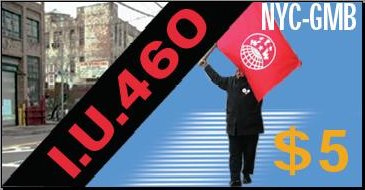Brooklyn warehouse bosses' Christmas gift: exploitation in the food industry
Submitted on Tue, 01/02/2007 - 12:52am
 Brooklyn, New York On January 2nd 2007 at 5:00AM, workers from the Food and Allied Workers Union (Industrial Workers of the World, I.U. 460) and their supporters will ring in the New Year with a picket targeting the Amersino Marketing Group at 161 Gardner Ave, Brooklyn, NY.
Brooklyn, New York On January 2nd 2007 at 5:00AM, workers from the Food and Allied Workers Union (Industrial Workers of the World, I.U. 460) and their supporters will ring in the New Year with a picket targeting the Amersino Marketing Group at 161 Gardner Ave, Brooklyn, NY.
Workers are marching on the Brooklyn foodstuffs distributor to highlight a civil suit that they will file with the help of the IWW in federal court over unpaid wages and overtime. The New Years march will also act as a ‘friendly reminder’ to their boss that the NYS minimum wage will be increasing to $7.15 an hour, a figure which Amersino has conveniently overlooked in the past.
The story of these workers’ struggle began in June of 2005 when several employees took the initiate to file a complaint with the Department of Labor over wage and hour violations. Workers at Amersino were often working in excess of 65 hours per week and receiving $300 to $350 for their labor, sometimes even less. Unfortunately, this abominable treatment is the norm rather than the exception in an industry plagued by flagrant labor law violations, where wages are paid by the week rather than by the hour.
Jose Flores, a worker from the nearby Queens-based EZ Supply, another foodstuffs distributor where workers have also organized with the IWW, had this to say: “Before we had the union we would often finish our delivery runs at 9:00 or 10:00PM every day. Our boss, Lester, would load up our trucks as high as he could, even though he knew it would take us until then to finish the orders because he paid us by the week. It didn't matter how long we worked, we always got the same paycheck. In the morning, Lester would say, ‘I don't care what time you finish dropping off the orders, even if it takes you until tomorrow. Finish or I never want to see you again.’”
After their initial complaint was filed, months went by but nothing happened. With little hope from the DOL and continuous abuse from their boss, Amersino workers decided to form a union after some of the drivers met with IWW organizers on the street. With the help of the Brooklyn-based community center Make the Road by Walking / Se Hace el Camino al Andar, these workers were able to retain a private lawyer to file new charges in federal court.
It was not until workers bravely marched on their plant in March of 2006, waving the IWW flag and wearing pins, did the boss finally start paying the minimum wage. Five wildcat strikes over the next five weeks soon followed protesting unpaid back-wages, anti-union discrimination, and verbal abuse. This culminated with a 3-day lockout when 5 workers were illegally terminated for federally protected union activity. While this kind of exploitation in the food industry is nothing new, what is new is that workers have begun to stand up for their rights and fight back against the bosses’ abuse and greed.
The campaign has been hard-fought and the battle is far from over. Thankfully, workers have been able to wrest some concessions from the industry bosses. The union’s first non-majority contract in the industry was signed at the distributor Handy Fat, outlining basic wage and overtime stipulations as well as a grievance procedure. A first collective bargaining agreement was also in the works at EZ Supply, but negotiations there have recently turned sour with the boss reneging on earlier promises and firing members of the union. Furthermore, the union has received scattered reports from warehouse workers in northern Brooklyn and Queens that some of the bosses are now starting to pay minimum wage and overtime. All in all, the IWW has an organized presence at 5 foodstuffs distributors in the area and though these workers haven’t won yet, they are standing together in solidarity and refuse to give in.
Amersino worker Diego Lezama summed up the workers’ sentiment in a phone conversation with IWW organizer Billy Randal during one of their wildcat strikes. “The boss said to me: ‘You brought this f--king union in here and I’m gonna get you for it.’” The workers responded by spontaneously walking out en masse, forcing the bosses’ apology for his comments, the first time he had ever apologized for anything. “We aren’t going to take this anymore,” Diego said. “They have to treat us like we’re human beings, not slaves.”
For more information contact - Billy Randel (646) 645-6284